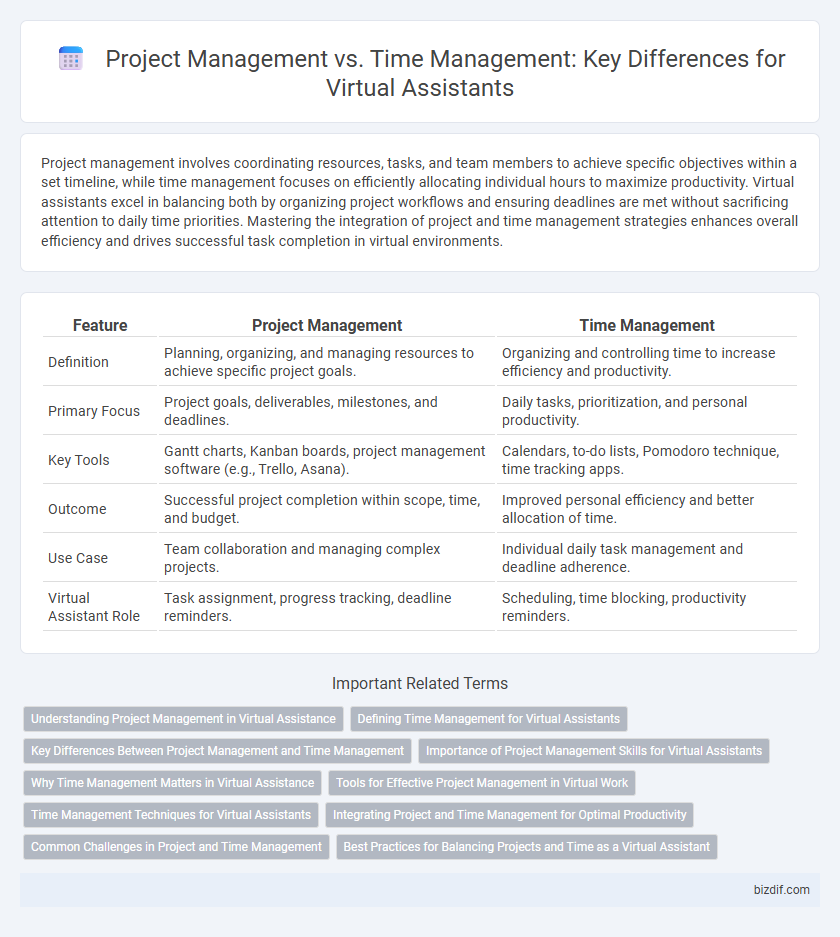Project management involves coordinating resources, tasks, and team members to achieve specific objectives within a set timeline, while time management focuses on efficiently allocating individual hours to maximize productivity. Virtual assistants excel in balancing both by organizing project workflows and ensuring deadlines are met without sacrificing attention to daily time priorities. Mastering the integration of project and time management strategies enhances overall efficiency and drives successful task completion in virtual environments.
Table of Comparison
| Feature | Project Management | Time Management |
|---|---|---|
| Definition | Planning, organizing, and managing resources to achieve specific project goals. | Organizing and controlling time to increase efficiency and productivity. |
| Primary Focus | Project goals, deliverables, milestones, and deadlines. | Daily tasks, prioritization, and personal productivity. |
| Key Tools | Gantt charts, Kanban boards, project management software (e.g., Trello, Asana). | Calendars, to-do lists, Pomodoro technique, time tracking apps. |
| Outcome | Successful project completion within scope, time, and budget. | Improved personal efficiency and better allocation of time. |
| Use Case | Team collaboration and managing complex projects. | Individual daily task management and deadline adherence. |
| Virtual Assistant Role | Task assignment, progress tracking, deadline reminders. | Scheduling, time blocking, productivity reminders. |
Understanding Project Management in Virtual Assistance
Project management in virtual assistance involves coordinating tasks, resources, and timelines to achieve specific goals within a digital workspace, emphasizing collaboration and efficient communication tools. Unlike time management, which focuses on individual productivity and scheduling, project management requires overseeing multiple interdependent activities and team members to ensure project milestones are met. Mastery of project management software and methodologies enables virtual assistants to streamline workflows, track progress, and deliver results that align with client objectives.
Defining Time Management for Virtual Assistants
Time management for virtual assistants involves prioritizing tasks, setting clear deadlines, and allocating specific time blocks to enhance productivity and meet client expectations efficiently. Effective time management minimizes distractions, ensures timely completion of project phases, and allows virtual assistants to balance multiple client demands without compromising quality. Utilizing tools like digital calendars, task management apps, and time-tracking software further optimizes workflow and accountability in remote work environments.
Key Differences Between Project Management and Time Management
Project management involves planning, organizing, and overseeing tasks to achieve specific objectives within a defined timeline, while time management focuses on effectively allocating individual time to maximize productivity. Project management emphasizes resource coordination, milestone tracking, and team collaboration, whereas time management centers on prioritizing activities and minimizing distractions. Understanding these distinctions helps virtual assistants optimize workflow by balancing strategic project goals with efficient daily time use.
Importance of Project Management Skills for Virtual Assistants
Project management skills enable virtual assistants to efficiently coordinate tasks, meet deadlines, and allocate resources, ensuring seamless project execution and client satisfaction. Mastery of these skills enhances workflow organization, risk assessment, and communication across teams, which directly improves overall productivity and service quality. Prioritizing project management competencies distinguishes virtual assistants in competitive markets, driving successful outcomes and fostering long-term professional growth.
Why Time Management Matters in Virtual Assistance
Effective time management in virtual assistance boosts productivity by prioritizing tasks and minimizing distractions, ensuring deadlines are met consistently. Unlike project management, which oversees overall objectives and resources, time management focuses on allocating individual work periods efficiently to maximize output. Mastering time management reduces stress and enhances the ability to handle multiple tasks in a remote work environment.
Tools for Effective Project Management in Virtual Work
Effective project management in virtual work relies on specialized tools such as Asana, Trello, and Microsoft Teams, which facilitate task assignment, progress tracking, and communication across dispersed teams. Unlike traditional time management apps like Toggl or RescueTime that prioritize individual productivity, project management tools integrate collaboration, deadlines, and resource allocation to ensure cohesive team performance. Leveraging these platforms enhances transparency, accountability, and timely delivery within remote and hybrid work environments.
Time Management Techniques for Virtual Assistants
Effective time management techniques for virtual assistants include prioritizing tasks using the Eisenhower Matrix, setting clear deadlines with time-blocking methods, and utilizing digital tools like Trello or Asana to track progress. Implementing Pomodoro Technique enhances focus and prevents burnout by breaking work into manageable intervals. Mastering these strategies improves productivity and ensures timely project completion in remote work environments.
Integrating Project and Time Management for Optimal Productivity
Integrating project management and time management enhances overall productivity by aligning task deadlines with project milestones, ensuring efficient resource allocation and timely completion. Utilizing tools like Gantt charts combined with time-tracking software allows virtual assistants to monitor progress and manage workloads effectively. This synergy reduces bottlenecks and optimizes workflow, leading to successful project delivery within set timeframes.
Common Challenges in Project and Time Management
Common challenges in project and time management include prioritizing tasks effectively and maintaining clear communication among team members. Inadequate resource allocation and unforeseen disruptions often lead to missed deadlines and increased stress. Virtual assistants can help streamline workflows by organizing schedules and monitoring project progress to mitigate these obstacles.
Best Practices for Balancing Projects and Time as a Virtual Assistant
Effective project management and time management are crucial for virtual assistants to enhance productivity and meet deadlines consistently. Prioritizing tasks through tools like Trello or Asana enables efficient tracking and delegation, while leveraging techniques such as time blocking or the Pomodoro Technique optimizes focus on high-value activities. Maintaining clear communication with clients ensures expectations are aligned and adjustments are made promptly to balance workload and avoid burnout.
Project management vs Time management Infographic

 bizdif.com
bizdif.com